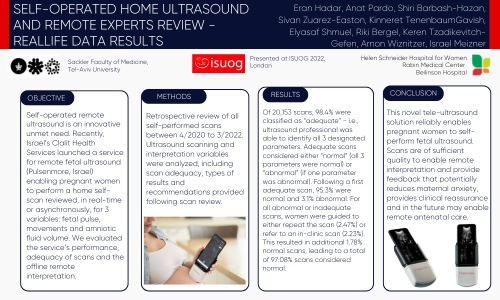Authors:
Eran Hadar, Anat Pardo, Shiri Barbash-Hazan, Sivan Zuarez-Easton, Kinneret TenenbaumGavish, Elyasaf Shmuel, Riki Bergel, Keren, Tzadikevitch-Gefen, Arnon Wiznitzer, Israel Meizner
Objective:
Self-operated remote ultrasound is an innovative unmet need. Recently, Israel’s Clalit Health Services launched a service for remote fetal ultrasound (Pulsenmore, Israel) enabling pregnant women to perform a home self-scan reviewed, in realtime or asynchronously, for 3 variables: fetal pulse, movements
and amniotic fluid volume. We evaluated the service’s performance, adequacy of scans and the offline remote interpretation.
Methods:
Retrospective review of all selfperformed scans between 4/2020 to 3/2022. Ultrasound scanning and interpretation variables were analyzed, including scan adequacy, types of results and recommendations provided following scan review.
Results:
Of 20,153 scans, 98.4% were classified as “adequate” – i.e., ultrasound professional was able to identify all 3 designated parameters. Adequate scans considered either “normal” (all 3 parameters were normal) or “abnormal” (if one parameter was abnormal). Following a first adequate scan, 95.3% were normal and 3.1% abnormal. For all abnormal or inadequate scans, women were guided to either repeat the scan (2.47%) or refer to an in-clinic scan (2.23%). This resulted in dditional 1.78% normal scans, leading to a total of 97.08% scans considered normal.
Conclusions:
This novel tele-ultrasound solution reliably enables pregnant women to self-perform fetal ultrasound. Scans are of sufficient quality to enable remote interpretation and provide feedback that potentially reduces maternal anxiety, provides clinical reassurance and in the future may enable remote antenatal care.


Presented at: ISOUG 2022, London UK


